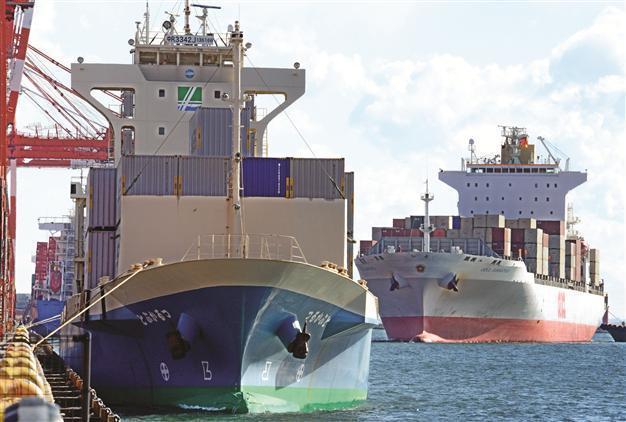Japan’s revised economic data sparks recession fears
TOKYO - Agence France-Presse

An international freighter is seen approaching a container terminal at the Tokyo port in yesterday’s photo. AFP photo
Japan confirmed yesterday the world’s third-largest economy shrank in the three months to September, stoking fears the country was slipping into a recession and fuelling speculation about fresh easing measures.Financial turmoil in Europe, an export-denting strong yen and a diplomatic row with major trade partner China have hurt Japan’s economy, dousing hopes it had cemented a recovery after last year’s quake-tsunami disaster.
Yesterday, data from the Cabinet Office confirmed earlier figures that showed Japan’s economy shrank 0.9 percent in the July-September quarter, or down 3.5 percent on an annualized basis.
The revised data also showed growth in the previous quarter was essentially flat, slipping 0.03 percent, reversing preliminary figures which had pointed to 0.1 percent growth in the April to June quarter.
That would meet the technical definition of a recession -- two successive quarters of negative growth -- but the government, the official arbiter of such matters, urged caution on interpreting the figures.
The data was likely, however, to heap pressure on the Bank of Japan for more aggressive policy action to stem a slowdown in the Japanese economy.
“We had already said Japan was in a recession. Today’s number strengthened our case,” said Tomo Kinoshita, chief economist at Nomura Securities in Tokyo.
Separate data released Monday showed Japan’s current account surplus was down about 30 percent on-year to 376.9 billion yen ($4.56 billion) in October, although the latest figure beat market expectations for a 218 billion yen surplus, according to Dow Jones Newswires.
The current account is the broadest measure of Japan’s trade with the rest of the world, including exports, tourism and overseas income.
Japan’s current account surpluses have been hit by a slowing global economy and a spike in fuel imports due to the shutdown of most of the country’s nuclear reactors following the 2011 quake-and-tsunami sparked nuclear crisis.
China dispute
To make matters worse, the flare-up in a decades-long row over a disputed island chain has sparked a consumer boycott of Japanese products in China, damaging a more than $340-billion annual trade relationship with Beijing.
Last month, Tokyo approved $10.7 billion in fresh spending to help boost the limp economy, more than double a package announced in October.
The new package was announced as the nation prepares for December 16 elections which are expected to see Prime Minister Yoshihiko Noda and his Democratic Party of Japan defeated by the main opposition Liberal Democratic Party led by Shinzo Abe.
















